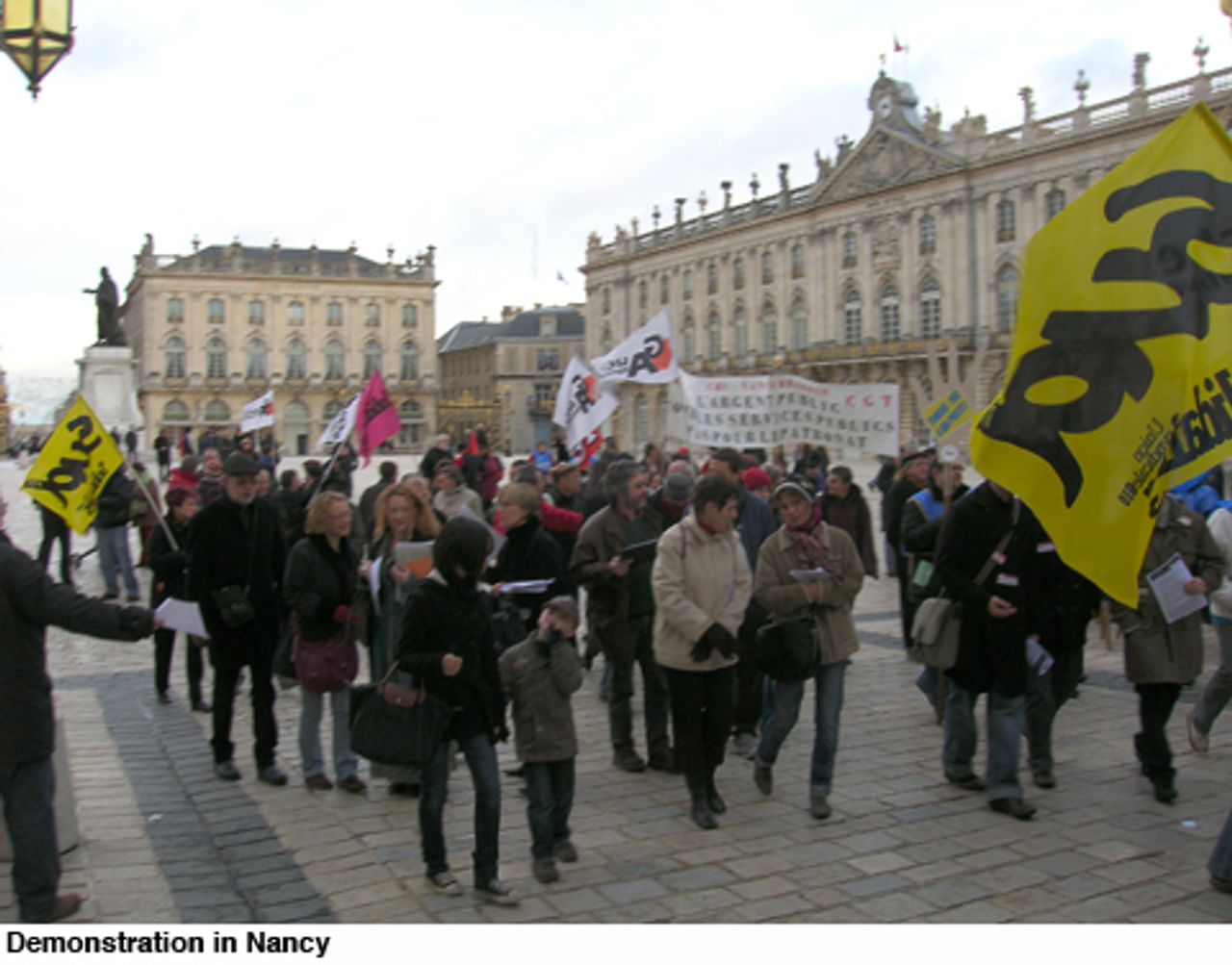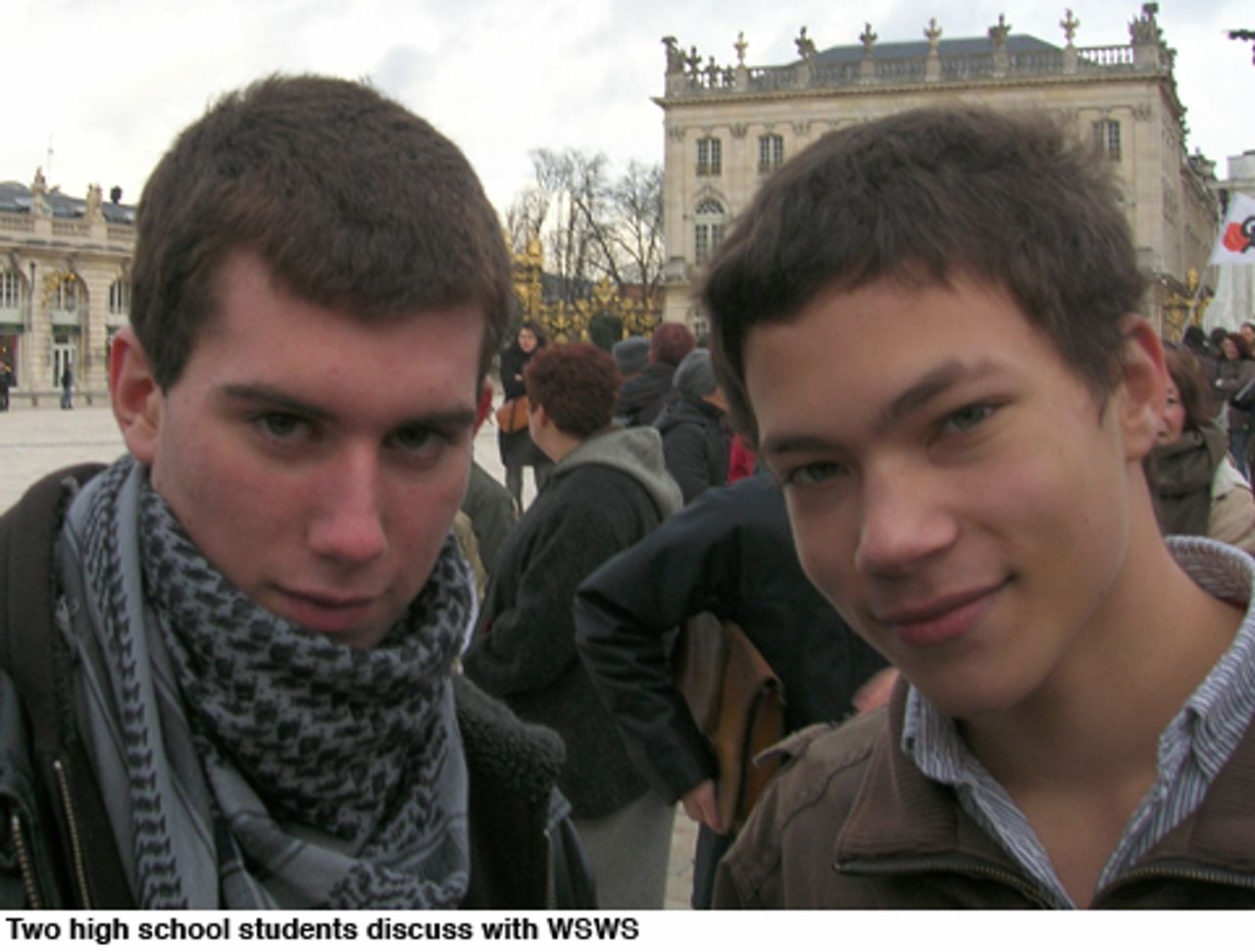Demonstrations took place in towns across France on Saturday against the planned privatization of the postal service. The protests were called by five unions against the planned change in status of La Poste on January 1, 2010 to a limited company. This would open up a 30 percent share of the postal service to private investors "to finance modernisation"—to the tune of €3 billion.
 Sponsoring the protests were the CGT (General Confederation of Labour), SUD (Solidarity, Unity, Democracy), Force ouvrière—FO (Workers Power), the CFDT (French Democratic Confederation of Labour), and the CFTC (French Confederation of Christian Workers).
Sponsoring the protests were the CGT (General Confederation of Labour), SUD (Solidarity, Unity, Democracy), Force ouvrière—FO (Workers Power), the CFDT (French Democratic Confederation of Labour), and the CFTC (French Confederation of Christian Workers).
The moves by La Poste management are in preparation for the full liberalisation of the postal market in the European Union, scheduled for 2011. Postal services in countries where privatisation has already been adopted have seen jobs slashed, post offices closed, worsened working conditions, rising prices, and deteriorating services—all in the drive for profitability.
Despite the reassurances by La Poste CEO Jean-Paul Bailly that the state would remain the majority shareholder, postal workers see the move as a threat to jobs and the quality of the public service.
Working conditions for postal workers have been in decline for many years. Only 53 percent enjoy the relative security and rights of government workers, many are on part-time contracts, and over 40 percent are on less favourable and insecure common contracts.
The November 22 demonstrations represented a weaker mobilisation than that of September 23. Organizers claimed 12,000 turned out in Paris, 1,000 in Marseille, 2,200 in Toulouse, and 500 in Lyon. Police figures were smaller; estimating that between a quarter and a third of these numbers took part.
Management reported that 4.7 percent of staff had struck, despite the fact that the unions had not issued a strike call. By contrast, the September 23 strike call brought out as many as a third of La Poste's 300,000-member workforce. The low turnout reflected, above all, a lack of confidence in the unions.
Nouvel Observateur reminded its readers on November 22, "At the beginning of November, the Elysée advisor, Henri Guaino, had stated that ‘for the moment it was no longer the intention ... to open up the capital of La Poste. The government had then gone back on these ambiguous words and said that it would come to a decision at the end of December. The government is waiting on delivery of a report by the Ailleret Commission, set up by Nicolas Sarkozy ... which is made up of trade unionists, political officials and representatives of La Poste, and has the task of studying the different ways of developing La Poste."
Olivier Besancenot, leader of the LCR-NPA (Revolutionary Communist League, at present in the process of founding the New Anti-capitalist Party), himself a part-time postman, seized on these assurances to claim, "It's a first social victory following on the September 23 strike... This victory can lead to others, especially against the closure of local hospitals, the privatisation of the health service."
Besancenot continued, "The government is caught between the economic crisis affecting many sectors of the economy—among some of the most important, such as the auto industry and steel—and the social opposition emerging in these enterprises, as Sarkozy saw for himself at Renault-Sandouville when the workers of the plant went on strike the day he came. We must strike while the iron is hot. The government must simply announce the withdrawal of the plan to privatise La Poste."
This statement covers up the role being played by the unions, which have consistently sought to break up and demoralise actions by postal workers to defend their statutory rights and conditions as well as their public service. The reference to the Renault-Sandouville workers is particularly cynical. Facing the loss of over 1,000 jobs, they have been isolated by the unions. Even as the workers protested that day, union leaders were negotiating at the plant with Sarkozy to damp down militancy with the promise of work, with the introduction of a new vehicle for production by 2012.
In their leaflet issued for the November 22 demonstration, the NPA was obliged to recognize—without openly admitting it—that what it had described as "social victory" at the postal service a month earlier was in fact a cheap manoeuvre. The government announced that the opening of La Poste to capital investment was "suspended," but declared that "it would indeed happen and at the planned date," the NPA stated. "The government is not giving up. It would just like to defuse the exasperation which is growing."
The NPA leaflet uncritically called for support by the demonstration for the appeal by the "CGT, CFDT, FO, CFTC, SUD" and the "National Committee for the mobilisation against the privatisation of La Poste, for a public debate and a referendum on the public postal service."
A joint petition by the French Communist Party and the Socialist Party also sought to spread the illusion that through "a great national debate" it was possible to "make the government retreat on privatisation."
The NPA leaflet again made exaggerated claims that sporadic actions, deliberately dispersed by the unions, would force Sarkozy to retreat. It proposed no political perspective for workers, but merely insisted that the day of protests would be "the first beginnings of a more general riposte" and that "We can win."
In this way, the NPA seeks to prevent postal workers from breaking from the trade unions and forming independent organisations to unite their struggles with those of workers in other industries and services to oppose attacks on social and democratic rights.
Their role has assisted the national union bureaucrats—who have worked hand in glove with Sarkozy since his election in May 2007 and enabled him to carry out his programme of social regression—in striking a pose of opposition. Bernard Thibault CGT (close to the Communist Party, PCF), Jean-Claude Mailly (FO), Jacques Voisin (CFTC), and Gérard Aschieri (FSU, Unitary Trade Union Federation, based in education) were all present on the Paris demonstration.
Socialist Party delegations were also in evidence, marching in Paris with Benoît Hammond, defeated contender for the party leadership, and Martine Aubry, the proclaimed victor over Ségolène Royal. Aubry, whose father and mentor Jacques Delors was long the chairman of the European Commission, campaigned for the European Union Constitution proposal aimed at facilitating privatisations such as at La Poste—which was rejected in the French and Dutch referendums in 2005—as well as the Lisbon Treaty—rejected by Irish voters this year.
 A reporter for the World Socialist Web Site in Nancy spoke to two 16-year-old high school students who said they were PCF supporters. They had come to support the demonstration "out of conviction." "We are getting screwed by capitalism... France is in a catastrophic situation." They admitted that "the mobilisation is less strong" but asserted "people will move; communism will make a come-back."
A reporter for the World Socialist Web Site in Nancy spoke to two 16-year-old high school students who said they were PCF supporters. They had come to support the demonstration "out of conviction." "We are getting screwed by capitalism... France is in a catastrophic situation." They admitted that "the mobilisation is less strong" but asserted "people will move; communism will make a come-back."
One demonstrator said he was not convinced by the "freezing" of the privatisation process. He mentioned the case of a nearby small town, Ars-sur-Moselle, whose 5,000 inhabitants have been deprived of a post office since a shopkeeper, subcontracted by La Poste, "had shut up shop."
Subscribe to the IWA-RFC Newsletter
Get email updates on workers’ struggles and a global perspective from the International Workers Alliance of Rank-and-File Committees.
